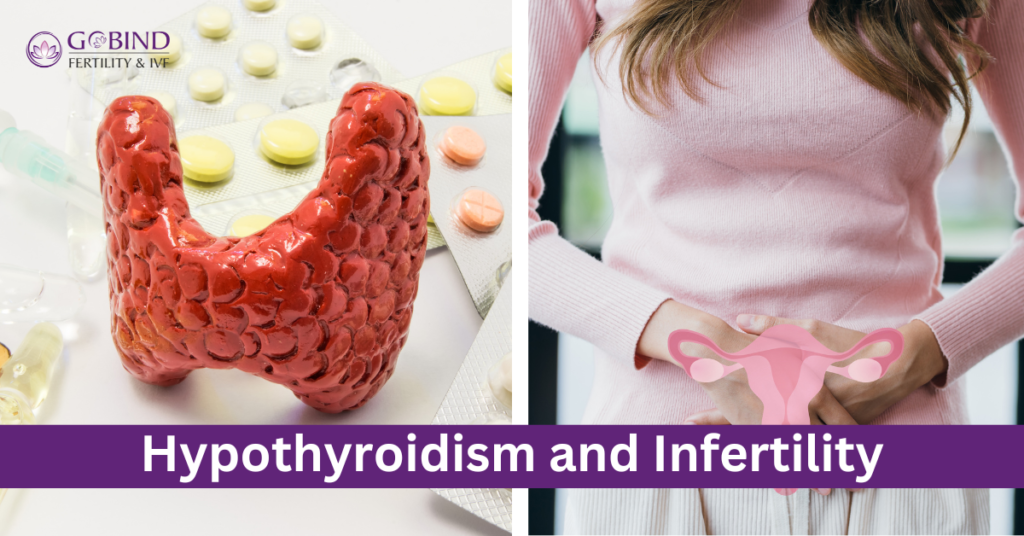Hypothyroidism and Infertility: What Couples Need to Know

For many couples dreaming of starting a family, the journey to conception can be unexpectedly challenging. One often overlooked factor in fertility struggles is thyroid health, particularly hypothyroidism.
Let’s explore how Hypothyroidism can impact your fertility and what you can do about it.
Hypothyroidism, a condition characterized by an underactive thyroid gland that fails to produce sufficient thyroid hormones, has become an increasingly recognized factor in reproductive health. The thyroid hormones—thyroxine (T4) and triiodothyronine (T3)—play crucial roles in various bodily functions, including metabolism, energy production, and reproductive health.
This article delves into the relationship between hypothyroidism and infertility, exploring the mechanisms involved, the effects on reproductive functions, and potential treatment options.
The Thyroid-Fertility Connection
Imagine your thyroid as the conductor of your body’s metabolic orchestra. When it’s not producing enough hormones – a condition known as hypothyroidism – it can throw your entire system out of tune, including your reproductive health.
It can do the following
Ovulation Disruption: Thyroid hormones play a crucial role in egg release. Low levels can lead to irregular or absent ovulation.
Luteal Phase Defects: A short luteal phase can make it difficult for a fertilized egg to implant.
Increased Prolactin: Hypothyroidism can elevate prolactin levels, interfering with regular ovulation.
Sperm Health: Yes, men are affected too! Low thyroid function can impact sperm quality and motility.
How Hypothyroidism Affects Fertility
Women with hypothyroidism may face several challenges that can contribute to infertility:
1. Menstrual Irregularities: Hypothyroidism can lead to irregular or absent menstrual cycles, making ovulation unpredictable. Anovulation (the absence of ovulation) is common, which significantly reduces the chances of conception.
2. Hormonal Imbalances: The thyroid gland interacts with the pituitary gland, which produces hormones that regulate the menstrual cycle. An underactive thyroid can disrupt this balance, leading to altered levels of luteinizing hormone (LH) and follicle-stimulating hormone (FSH), both crucial for ovulation.
3. Endometrial Receptivity: Thyroid hormones are important for the development of the endometrium (the uterine lining). Hypothyroidism can result in a thinner endometrial lining, reducing the likelihood of successful implantation of a fertilized egg
4. Increased Risk of Miscarriage: Women with untreated hypothyroidism may have a higher risk of miscarriage. The imbalance of hormones can affect pregnancy maintenance in the early stages.
5. Impaired Sexual Function: Hypothyroidism can also lead to decreased libido and sexual dysfunction, further complicating the journey to conception.
Recognizing the Signs
Hypothyroidism can be sneaky, with symptoms often mistaken for stress or other conditions. Keep an eye out for:
- Unexplained weight gain
- Fatigue
- Hair loss
- Cold sensitivity
- Irregular periods
Diagnosis and Treatment: Your Path to Parenthood
If you’re struggling to conceive and suspect thyroid issues, don’t lose hope! Modern medicine offers effective solutions.
Getting Diagnosed
A simple blood test can measure your thyroid-stimulating hormone (TSH) levels. Your doctor may also check for thyroid antibodies and other hormones if needed.
Treatment Options
Levothyroxine, a synthetic thyroid hormone, is the most common treatment. It’s safe, effective, and can dramatically improve your fertility odds.
Beyond Medication: Holistic Approaches
While medication is crucial, lifestyle changes can also boost your fertility:
- Nutrition: Iodine-rich foods like seaweed and Brazil nuts support thyroid function.
- Stress Management: Try yoga or meditation to reduce stress, which can exacerbate thyroid issues.
- Exercise: Regular, moderate exercise can help regulate hormones.
Pregnancy and Thyroid Health
Once you conceive, proper thyroid management remains crucial. Hypothyroidism during pregnancy can increase risks of miscarriage, preterm birth, and developmental issues.
Coping Strategies for the Journey
The path to parenthood with hypothyroidism can be emotionally challenging. Remember:
- You’re Not Alone: Join support groups or online forums to connect with others facing similar challenges.
- Stay Informed: Knowledge is power. Keep learning about your condition.
- Communicate: Be open with your partner about your feelings and concerns.
- Seek Professional Help
If You are someone who is suffering from Hypothyroidism and is unable to conceive, it is recommended to meet one of the best fertility specialists in Hisar Dr Manju Khurana for consultation.
